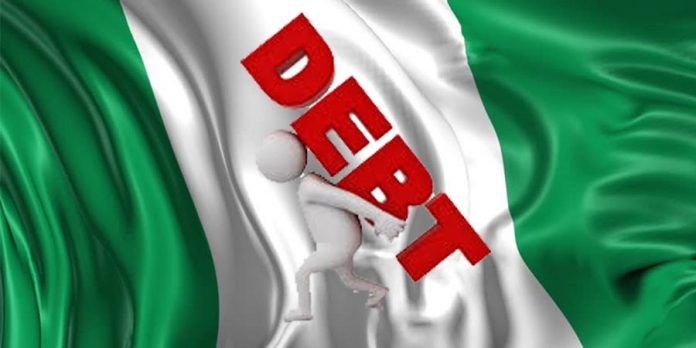On August 29, 2019, I published a column in The Daily Independent with this headline: Are we sinking in debts? I was worried by the federal government easy recourse to foreign debts. Let me begin this two-part series in trying answer that question by reproducing that column here as a teaser. Here it is with some slight editing:
An exchange of pleasantries between two Nigerians is usually a fair indication of the state of the nation’s economy, as this example illustrates:
“My brother, how now?”
“Ha, my brother, country hard.”
“You mean say better no dey after the general elections?”
“You still dey talk about better? You dey live on the moon or in Ajegunle?”
When the country is hard for the people, you need no one to tell you that the people down the rungs of the societal ladder mostly feel the itch and the pinch of an economy with a bad attitude. The national economy is the pillar of progress and stability both for the country and its citizens. If things are going well for the economy, “country no go hard.” If the good times are rolling, who remembers something has dry as economic science? But when “country hard,” we must look over the shoulders of the managers of our national economy to see if we can read the state of the health of the economy from the chicken entrails before them.
The headline of this column invites us to do just that – look over the shoulders of the thingamabobs who preside over the health and the direction of the economy. It is an important question that should jolt us out of our somnolent, laid-back belief that this country is swimming in dollars, thanks to the almighty crude oil that is both a blessing and a curse. The truth is that the times are truly hard. It is hard for the governments – federal, state, and local governments. And it is hard, very hard, for the people. The insolvency of our nation should no longer be a matter of causal concern. It is a matter for deep concern.
The states are groaning under a crushing debt burden. The Debt Management Office, DMO, recently released details of the domestic debts owed by the 36 states.
These may be a pointer to either the early or the delayed arrival of the good times post the campaign promises of the big men. The debts are heavy. They come to a tidy but treasury deficit of N3.97 trillion as at the end of March this year. DMO gave a breakdown of the debts by geo-political zones and by individual states. These figures give us a clearer picture of the financial situation of each state in the country. From a casual reading of the figures, we have a fair idea of why the times are hard – and possibly getting harder for the governments and the people.
According to the DMO, this is how the geopolitical zones stand in their debt profiles: South-West leads the pack with a handsome exposure of N1.04 trillion. Of this Lagos State, the fifth largest economy in Africa, not surprisingly, accounts for N542.23 billion. That is more than half of the total. Ondo, the state that is about to turn marijuana into a huge commercial enterprise, owes least debts of only N56.96 billion.
South-South, the crude oil landlords and arguably the richest geo-political zone in the country: N949.4 billion. All of them, except Edo State, are heavy debtors.
North-Central: N648.63 billion. Niger State carries the least debt burden in the zone with N43.41 billion. North-West: N485.39 billion. Sokoto State carries the lightest domestic debt burden in the zone with N36.57 billion. North-East: NN441.19 billion. The least exposed state in the zone is Yobe, with a bearable debt load of N26.99 billion. South-East: N305.67 billion. Anambra State has the least domestic debt burden of N33.49 billion.
Debts are a) indicators of the bad attitude of the global economy b) how a nation is fairing in the management of its resources and c) evidence of poor or incompetent financial husbandry. Debt is a trap programmed to spring up in the future. This level of financial exposure by the state governments points to shows that the 2016 recession still casts a looming shadow on the national economy.
During the presidential campaign earlier in the year, Peter Obi, vice-presidential candidate of the Peoples Democratic Party, PDP, said that the Buhari administration had placed on the country a new debt burden of $80 billion. Obi said then, “This present regime has plunged us into a deeper debt profile to the tune of $80 billion, an indication that the nation is collapsing.”
Shorn of its political exaggerations, Obi’s claim was neither wild nor untrue. Two months before Buhari assumed office in May 2015, the total debt burden on the government’s neck was $12 trillion. Less than a month later, it increased slightly to $12.1 trillion. By June 2018, however, it made a giant leap to nearly double what it was in May from $12.1 trillion to $22.4 trillion. Africa Check reports that as at then this was the true picture of the debt level incurred by the federal government.
Africa Check quotes Atiku Samuel, head of research at BudgiT, a civil society group that takes on itself the tough task of keeping a tab on public spending to make it transparent and accountable, as saying: “What you see at the Debt Management Office is just a fraction of Nigeria’s debt. There are special accounts that are dedicated by law, but unfortunately the federal government has been taking funds from (them) to meet its budgetary obligation.”
What is the government borrowing for? Africa Check wanted to know. For an answer, it quotes a 2017 report on the national debt level issued by the Debt Management Office. In it, DMO was quoted as having reported that “While Nigeria’s total public debt stock is relatively low vis-à-vis the country’s GDP, the increased funding requirements needed to sustain the economic recovery, address the huge infrastructural deficit, as well as meet budget financing requirements, would entail enormous funding resources, including borrowing.”
There is a vicious circle here. The borrower is led to borrow more because his needs for more money increases with the level of his developmental ambition. But sooner or later, the lure of borrowing pushes him into the debt trap. Debt trap. Debt burden. The twin evils are ever present dangers in all countries, big and small.
The prospects of doing things with other people’s money now to pay back later, much later, is quite often irresistible. A country may inadvertently mortgage its future for today’s caviar.
The debt trap leads to the debt burden that a new generation of leaders must service. They then borrow more to repay the old debts and incur new and even more debts. The creditor has a bad habit of wrongly timing his knock at the door of the debtor. Every nation that goes a-borrowing dreads this because when the creditor comes calling in the future, new problems arise for the debtor nation.
(To be concluded)



